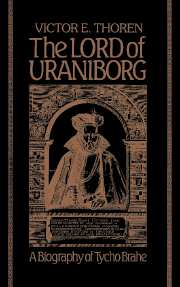Book contents
- Frontmatter
- Contents
- Preface
- 1 A Noble Humanist
- 2 The New Star
- 3 Becoming a Professional
- 4 The First Years on Hven: 1576–1579
- 5 Urania's Castle
- 6 The Flowering of Uraniborg
- 7 First Renovations: The Solar Theory
- 8 The Tychonic System of the World
- 9 High Tide: 1586–1591
- 10 The Theory of the Motion of the Moon
- 11 The Last Years at Uraniborg
- 12 Exile
- 13 A Home Away from Home?
- Epilogue
- Appendix 1 Abbreviations for Frequently Cited Sources
- Appendix 2 Glossary of Technical Terms
- Appendix 3 The Tychonic Lunar Theory
- Appendix 4 Figures for Footnotes
- Appendix 5 Tycho's Dwellings in Exile
- Appendix 6 Letters, 1599–1601
- Author Index
- Subject Index
1 - A Noble Humanist
Published online by Cambridge University Press: 04 May 2010
- Frontmatter
- Contents
- Preface
- 1 A Noble Humanist
- 2 The New Star
- 3 Becoming a Professional
- 4 The First Years on Hven: 1576–1579
- 5 Urania's Castle
- 6 The Flowering of Uraniborg
- 7 First Renovations: The Solar Theory
- 8 The Tychonic System of the World
- 9 High Tide: 1586–1591
- 10 The Theory of the Motion of the Moon
- 11 The Last Years at Uraniborg
- 12 Exile
- 13 A Home Away from Home?
- Epilogue
- Appendix 1 Abbreviations for Frequently Cited Sources
- Appendix 2 Glossary of Technical Terms
- Appendix 3 The Tychonic Lunar Theory
- Appendix 4 Figures for Footnotes
- Appendix 5 Tycho's Dwellings in Exile
- Appendix 6 Letters, 1599–1601
- Author Index
- Subject Index
Summary
Among the mass of detail that constitutes the personal, social, cultural, and intellectual background of Tycho Brahe's scientific achievement, the one indispensable fact is that he was born a Brahe, that is, born not merely into the Danish nobility but also into the small fraction of the noble class that had historically played significant roles in the administration, governance, and defense of the realm. The epitome of this special status was membership in the Rigsraad, or Council of the Realm. Nominally an advisory body for the king but actually an oligarchical institution devoted to defending the interests of the most powerful noble families, the Rigsraad consisted of twenty-odd members who declared war, concluded treaties of peace, appointed regents (among themselves, naturally), seated kings, and participated with kings in virtually every aspect of the daily affairs of state.
All four of Tycho's great-grandfathers and both of his grandfathers had been councillors (see Fig 1.1). His paternal grandfather and namesake, Tyge Brahe, had held that honor only briefly before being killed during the siege of Malmø in 1523, fighting in the cause that put Frederick I on the throne and brought the Reformation to Denmark. But Tyge's widow, Sophie Rud, was descended from the equally powerful Rosenkrantz and Gyldenstierne families and thus had her father and brother on the council to look after the interests of her young family.
- Type
- Chapter
- Information
- The Lord of UraniborgA Biography of Tycho Brahe, pp. 1 - 39Publisher: Cambridge University PressPrint publication year: 1991



